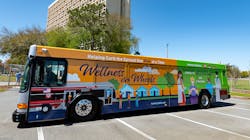FTA encourages more transit to vaccine service as National Month of Action
The Biden Administration wants to see 70 percent of U.S. adults receive at least one COVID-19 vaccination shot by July 4 and is rallying national organizations, local leaders, community groups and more in a National Month of Action in “an all-of-America sprint” to reach the goal.
As of June 7, data from the Centers for Disease Control and Prevention (CDC) reports 63.7 percent of the U.S. population has received at least one dose of the vaccine, while 42.1 percent are considered fully vaccinated (two weeks after the second shot or two weeks after a single shot vaccine).
Providing access to vaccination sites via transit service can ensure the national vaccination program equitably protects all people and can help “agencies build a bridge to a brighter post-pandemic future.”
The U.S. Department of Transportation’s (USDOT) Federal Transit Administration (FTA) is offering its gratitude to the more than 350 transit systems that are employing various methods to connect people to vaccinations.
“Getting vaccinated is the best way to defeat this virus and resume being able to gather safely with our friends and loved ones,” said U.S. Transportation Secretary Pete Buttigieg. “We are grateful for the service and creativity of transit agencies across the country that are providing access to vaccines and encourage every state, county and city to do the same during our Month of Action.”
The American Rescue Plan, which was signed into law in March, included $30.5 billion for the transit industry to bridge pandemic-induced revenue gaps. The third round of transit emergency funding can also be used to provide transportation services connecting people to vaccines. FTA notes several transit agencies have focused on improving access in areas with low vaccination rates.
For example, in Jacksonville, Fla., where the vaccination rate is just over 30 percent, the Jacksonville Transportation Authority (JTA) has partnered with Agape Family Health to launch “Wheels to Wellness,” a mobile vaccination clinic using transit buses in areas with gaps in health equity. In Augusta, Ga., where the vaccination rate is just 25 percent, Augusta Transit is partnering with the Richmond County’s Department of Public Health to provide vaccinations at the agency’s Broad Street Transfer Center near downtown Augusta.
“Thanks to the administration’s focus on the vaccination rollout and commitment to supporting infrastructure, transit agencies across the country are stepping up to meet the needs of their communities and help residents access vaccines,” said FTA Deputy Administrator Nuria Fernandez.
Several transit agencies have set up vaccination sites on their properties to make it easier for riders and members of the community to access vaccines.
For example, the Washington Metropolitan Area Transit Authority (WMATA) converted a parking lot at its Greenbelt Metro Station and partnered with the Federal Emergency Management Agency (FEMA) to provide a COVID-19 vaccination site. The site was selected to ensure that those without a car in the Washington, D.C., region have access to vaccinations.
In addition, Foothill Transit, which serves Southern California’s San Gabriel and Pomona Valleys, recently opened its second transit-accessible vaccination site at its El Monte Station in Los Angeles County. The site, a transit hub connecting the San Gabriel Valley to downtown Los Angeles, follows the agency’s opening of vaccination services at its Covina station – both served by bus.
Transit agencies in both urban and rural communities across the country have waived fares to vaccination sites and appointments. Some examples include:
VIA Transit in San Antonio, Texas, has offered free transit trips to anyone traveling to an appointment for a COVID-19 vaccination. After launching its free-travel program in January, VIA has provided more than 1,900 fare-free rides.
To support the COVID-19 vaccination effort in its rural South Central Texas community, SPARTAN Public Transit provided free bus rides to appointments and assigned staff to help residents find the nearest vaccination site accessible by transit. SPARTAN retrofitted its brand-new Levelland transit facility to be the community’s first mass vaccination site, and, in a single day, the clinic vaccinated nearly 1,000 people.
In rural south-central Colorado, the city of Pueblo partnered with FEMA to provide access to COVID-19 vaccines for all Pueblo residents. To ensure everyone could access the vaccination site at the Colorado State Fairgrounds, Pueblo Transit offered free bus rides for all residents starting in mid-April.
To help rural residents travel to approximately 40 COVID-19 vaccination sites in western Massachusetts, Pioneer Valley Transit Authority (PVTA) launched a website for riders to identify locations and the bus routes to get them there. PVTA partnered with Baystate Medical Center to facilitate ride scheduling for their patients, primarily over age 60, who needed rides to appointments.
To support COVID-19 vaccination efforts in rural Goldsboro, N.C., the Goldsboro Wayne Transportation Authority has been providing free bus rides to vaccination appointments since February. Working with the North Carolina Department of Transportation, the agency has provided hundreds of trips for residents in and outside Goldsboro, including a designated date in February to transport at-risk seniors.
FTA directs agencies interested in finding out more about funding eligibility to visit its “Frequently Asked Questions” on the topic, which is linked here.
About the Author
Mass Transit Staff Report
Stories under this byline were produced through a team effort by the editorial staff of Mass Transit.
To learn more about our team, click here.
If you have a story idea, let us know by emailing [email protected]. Please review our contributor guidelines found here.
